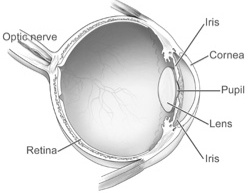Neuro-ophthalmology
 What is it?
What is it?
Neuro-ophthalmology is a subspecialty that studies the relationship between the eyes and the brain. Mr. Papadedes systematically deals with this field studying the relationship between some specific eye symptoms and:
- Optic neuropathies
- Eye movement disorders
- Pupillary abnormalities and
- Central nervous system diseases
What are the most common diseases?
- Optic neuritis
- Ischemic optic neuropathy
- Optic nerve compression
- Myasthenia gravis
- Oculomotor nerve palsy
- Pupil abnormalities
- Brain tumors associated with vision
- Strokes associated with vision

What are the symptoms that I have to know about?
- Short-term or long-term vision loss - partial or total
- Vision disorders (blurry vision, "flashes", "floaters" etc.)
- Diplopia (double vision)
- Anisocoria (unequal size of the eyes' pupils)
- Ptosis (of eyelid) - Blepharospasm
If you have these symptoms, you should see a specialist for quick, reliable response to your questions. Neuro-ophthalmic diseases are often associated with more severe health problems that require thorough examination. In any case, in order to avoid unpleasant health consequences, patients should not underestimate the severity of their symptoms.




